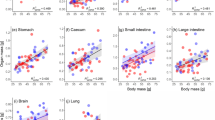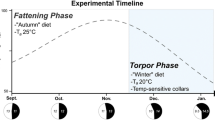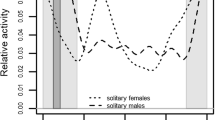Abstract
Animals that spend more energy than they obtain risk entering allostatic overload, reducing survival and fitness. They are predicted to adjust their daily energy expenditure (DEE) during periods of food scarcity. Adjustments of DEE to changes in food availability have been well-studied in species in temperate zones during winter, but less so in species enduring seasonal droughts. Likely mechanisms regulating DEE involve adjustments of activity and maintenance metabolism. Species that experience seasonal droughts and changes in food availability, like the African striped mouse (Rhabdomys pumilio), are appropriate model organisms to study the regulation of seasonal changes of DEE. We quantified DEE using the ‘doubly labelled water’ method, measured resting metabolic rate (RMR), and concomitantly determined activity levels using all-day focal observations of 69 free-living striped mice in the cold moist season with high food availability and the hot dry season with low food availability. Striped mice decreased their DEE in the food scarce dry season using multiple mechanisms, especially reductions in RMR, and reduced overall physical activity. This was further facilitated passively by reduced thermoregulatory costs. Our study demonstrates that animals reduce DEE via active and passive mechanisms in food-restricted environments, and highlights that several environmental factors should be considered simultaneously when aiming to understand how animals cope with harsh environments.



Similar content being viewed by others
References
Bacigalupe LD, Rezende EL, Kenagy GJ, Bozinovic F (2003) Activity and space use by degus: a trade-off between thermal conditions and food availability? J Mammal 84:311–318
Bartoń K (2013) MuMIn: multi-model inference, R package version 1.9.13
Bennett AF, Ruben JA (1979) Endothermy and activity in vertebrates. Science 206:649–654
Black A, Prentice A, Coward W (1986) Use of food quotients to predict respiratory quotients for the doubly-labelled water method of measuring energy expenditure. Hum Nutr 40:381–391
Boutin S (1990) Food supplementation experiments with terrestrial vertebrates: patterns, problems, and the future. Can J Zool 68:203–220
Bozinovic F, Bacigalupe LD, Vásquez RA et al (2004) Cost of living in free-ranging degus (Octodon degus): seasonal dynamics of energy expenditure. Comp Biochem Physiol Part A 137:597–604. https://doi.org/10.1016/j.cbpb.2003.11.014
Bozinovic F, Rojas JM, Broitman BR, Vásquez RA (2009) Basal metabolism is correlated with habitat productivity among populations of degus (Octodon degus). Comp Biochem Physiol Part A 152:560–564. https://doi.org/10.1016/j.cbpa.2008.12.015
Chery I, Zahariev A, Simon C, Blanc S (2015) Analytical aspects of measuring 2H/1H and 18O/16O ratios in urine from doubly labelled water studies by high-temperature conversion elemental analyser-isotope-ratio mass spectrometry. Rapid Commun Mass Spectrom 29:562–572. https://doi.org/10.1002/rcm.7135
Corp N, Gorman ML, Speakman JR (1997) Seasonal variation in the resting metabolic rate of male wood mice Apodemus sylvaticus from two contrasting habitats 15 km apart. J Comp Physiol B 167:229–239
Degen AA, Kam M (1995) Scaling of field metabolic rate to basal metabolic rate in homeotherm. Écoscience 2:48–54
Drent R, Daan S (1980) The prudent parent: energetic adjustments in avian breeeding. Ardea 68:225–252
Edwards W, Lonsdorf EV, Pontzer H (2017) Total energy expenditure in captive capuchins (Sapajus apella). Am J Primatol. https://doi.org/10.1002/ajp.22638
Fox J, Weisberg S (2011) An R companion to applied regression, 2nd edn. Sage Publications, London
Fuglei E, Oritsland NA (1999) Seasonal trends in body mass, food intake and resting metabolic rate, and induction of metabolic depression in arctic foxes (Alopex lagopus) at Svalbard. J Comp Physiol B 169:361–369
Goran MI (2005) Estimating energy requirements: regression based prediction equations or multiples of resting metabolic rate. Public Health Nutr 8:1184–1186. https://doi.org/10.1079/PHN2005803
Green RA, Bear GD (1990) Seasonal cycles and daily activity patterns of Rocky Mountain elk. J Wildl Manage 54:272–279
Gutman R, Yosha D, Choshniak I, Kronfeld-Schor N (2007) Two strategies for coping with food shortage in desert golden spiny mice. Physiol Behav 90:95–102. https://doi.org/10.1016/j.physbeh.2006.08.033
Haim A, Fourie F le R (1980) Heat production in nocturnal (Praomys natalensis) and diurnal (Rhabdomys pumilio) South African murids. South African J Zool 15:91–94. https://doi.org/10.1080/02541858.1980.11447692
Heimann M, Käsermann HP, Pfister R et al (2009) Blood collection from the sublingual vein in mice and hamsters: a suitable alternative to retrobulbar technique that provides large volumes and minimizes tissue damage. Lab Anim 43:255–260
Jäger J, Schradin C, Pillay N, Rimbach R (2017) Active and explorative individuals are often restless and excluded from studies measuring resting metabolic rate: do alternative metabolic rate measures offer a solution? Physiol Behav 174:57–66. https://doi.org/10.1016/j.physbeh.2017.02.037
Jönsson KI, Korpimäki E, Pen I, Tolonen P (1996) Daily energy expenditure and short-term reproductive costs in free-ranging Eurasian Kestrels (Falco tinnunculus). Funct Ecol 10:475–482
Korhonen H, Harri M (1984) Seasonal changes in thermoregulation of the raccoon dog (Nyctereutes procyonoides Gray 1834). Comp Biochem Physiol 77A:213–219
Krackow S (1989) Effect of food restriction on reproduction and lactation in house mice mated post partum. J Reprod Fertil 86:341–347
Lifson N, McClintock R (1966) Theory of use of the turnover rates of body water for measuring energy and material balance. J Theor Biol 12:46–74. https://doi.org/10.1016/0022-5193(66)90185-8
Lighton JRB (2008) Measuring metabolic rates. A manual for scientists. Oxford University Press, Oxford
Lovegrove BG (2003) The influence of climate on the basal metabolic rate of small mammals: a slow-fast metabolic continuum. J Comp Physiol B 173:87–112. https://doi.org/10.1007/s00360-002-0309-5
Lovegrove BG (2005) Seasonal thermoregulatory responses in mammals. J Comp Physiol B 175:231–247. https://doi.org/10.1007/s00360-005-0477-1
Lynch GR (1973) Seasonal changes in thermogenesis, organ weights, and body composition in the white-footed mouse, Peromyscus leucopus. Oecologia 13:363–376. https://doi.org/10.1007/BF01825526
McEwen BS, Wingfield JC (2003) The concept of allostasis in biology and biomedicine. Horm Behav 43:2–15. https://doi.org/10.1016/S0018-506X(02)00024-7
McNab BK (1997) On the utility of uniformity in the definition of basal rate of metabolism. Physiol Zool 70:718–720
Meerlo P, Bolle L, Visser GH et al (1997) Basal metabolic rate in relation to body composition and daily energy expenditure in the field vole, Microtus agrestis. Physiol Zool 70:362–369
Merkt JR, Taylor CR (1994) “Metabolic switch” for desert survival. Proc Natl Acad Sci 91:12313–12316
Mueller P, Diamond J (2001) Metabolic rate and environmental productivity: well-provisioned animals evolved to run and idle fast. Proc Natl Acad Sci USA 98:12550–12554. https://doi.org/10.1073/pnas.221456698
Ostrowski S, Mésochina P, Williams JB (2006) Physiological adjustments of sand gazelles (Gazella subgutturosa) to a boom-or-bust economy: standard fasting metabolic rate, total evaporative water loss, and changes in the sizes of organs during food and water restriction. Physiol Biochem Zool 79:810–819
Perrigo G (1987) Breeding and feeding strategies in deer mice and house mice when females are challenged to work for their food. Anim Behav 35:1298–1316
Pontzer H, Raichlen DA, Wood BM et al (2015) Energy expenditure and activity among Hadza hunter-gatherers. Am J Hum Biol 27:628–637. https://doi.org/10.1002/ajhb.22711
Racette SB, Schoeller DA, Luke AH et al (1994) Relative dilution spaces of 2H- and 18O-labeled water in humans. Am J Physiol 30:E585–E590
Rimbach R, Willigenburg R, Schoepf I et al (2016) Young but not old adult African striped mice reduce their activity in the dry season when food availability is low. Ethology 122:828–840. https://doi.org/10.1111/eth.12527
Rimbach R, Pillay N, Schradin C (2017) Both thyroid hormone levels and resting metabolic rate decrease in African striped mice when food availability decreases. J Exp Biol 220:837–843. https://doi.org/10.1242/jeb.151449
Rimbach R, Jäger J, Pillay N, Schradin C (2018) Food availability is the main driver of seasonal changes in resting metabolic rate in African striped mice (Rhabdomys pumilio). Physiol Biochem Zool 91:826–833. https://doi.org/10.1086/696828
Romero LM, Dickens MJ, Cyr NE (2009) The reactive scope model - a new model integrating homeostasis, allostasis, and stress. Horm Behav 55:375–389. https://doi.org/10.1016/j.yhbeh.2008.12.009
Ruf T, Geiser F (2015) Daily torpor and hibernation in birds and mammals. Biol Rev 90:891–926. https://doi.org/10.1111/brv.12137
Rymer T, Pillay N, Schradin C (2016) Resilience to droughts in mammals: vulnerability of a single species. Q Rev Biol 91:133–176
Scantlebury M, Bennett NC, Speakman JR et al (2006) Huddling in groups leads to daily energy savings in free-living African four-striped grass mice, Rhabdomys pumilio. Funct Ecol 20:166–173. https://doi.org/10.1111/j.1365-2435.2006.01074.x
Schielzeth H (2010) Simple means to improve the interpretability of regression coefficients. Methods Ecol Evol 1:103–113. https://doi.org/10.1111/j.2041-210X.2010.00012.x
Schradin C (2006) Whole-day follows of striped mice (Rhabdomys pumilio), a diurnal murid rodent. J Ethol 24:37–43. https://doi.org/10.1007/s10164-005-0158-2
Schradin C (2008) Seasonal changes in testosterone and corticosterone levels in four social classes of a desert dwelling sociable rodent. Horm Behav 53:573–579. https://doi.org/10.1016/j.yhbeh.2008.01.003
Schradin C, Pillay N (2004) The striped mouse (Rhabdomys pumilio) from the Succulent Karoo, South Africa: a territorial group-living solitary forager with communal breeding and helpers at the nest. J Comp Psychol 118:37–47. https://doi.org/10.1037/0735-7036.118.1.37
Schradin C, Pillay N (2005) Demography of the striped mouse (Rhabdomys pumilio) in the succulent karoo. Mamm Biol Zeitschrift für Säugetierkd 70:84–92. https://doi.org/10.1016/j.mambio.2004.06.004
Schradin C, Pillay N (2006) Female striped mice (Rhabdomys pumilio) change their home ranges in response to seasonal variation in food availability. Behav Ecol 17:452–458. https://doi.org/10.1093/beheco/arj047
Schradin C, Scantlebury M, Pillay N, König B (2009) Testosterone levels in dominant sociable males are lower than in solitary roamers: physiological differences between three male reproductive tactics in a sociably flexible mammal. Am Nat 173:376–388. https://doi.org/10.1086/596535
Schradin C, König B, Pillay N (2010) Reproductive competition favours solitary living while ecological constraints impose group-living in African striped mice. J Anim Ecol 79:515–521. https://doi.org/10.1111/j.1365-2656.2009.01651.x
Schradin C, Lindholm AK, Johannesen J et al (2012) Social flexibility and social evolution in mammals: a case study of the African striped mouse (Rhabdomys pumilio). Mol Ecol 21:541–553. https://doi.org/10.1111/j.1365-294X.2011.05256.x
Simmen B, Bayart F, Rasamimanana H et al (2010) Total energy expenditure and body composition in two free-living sympatric lemurs. PLoS One 5:e9860. https://doi.org/10.1371/journal.pone.0009860
Speakman JR (1997a) Factors influencing the daily energy expenditure of small mammals. Proc Nutr Soc 56:1119–1136
Speakman JR (1997b) Doubly-labelled water: theory and practice. Chapman and Hall, London
Speakman JR (2000) The cost of living: field metabolic rates of small mammals. Adv Ecol Res 30:177–297. https://doi.org/10.1016/S0065-2504(08)60019-7
Speakman JR, Hambly C (2016) Using doubly-labelled water to measure free-living energy expenditure: some old things to remember and some new things to consider. Comp Biochem Physiol Part A 202:3–9. https://doi.org/10.1016/j.cbpa.2016.03.017
Speakman JR, Król E, Johnson MS (2004) The functional significance of individual variation in basal metabolic rate. Physiol Biochem Zool 77:900–915
Thomas DW, Blondel J, Perret P et al (2001) Energetic and fitness costs of mismatching resource supply and demand in seasonally breeding birds. Science 291:2598–2600. https://doi.org/10.1126/science.1057487
Tomasi TE, Mitchell DA (1996) Temperature and photoperiod effects on thyroid function and metabolism in cotton rats (Sigmodon hispidus). Comp Biochem Physiol Part A Physiol 113:267–274
Warnecke L, Schleucher E, Geiser F (2010) Basking behaviour in relation to energy use and food availability in one of the smallest marsupials. Physiol Behav 101:389–393. https://doi.org/10.1016/j.physbeh.2010.07.003
Wingfield JC, Moore MC, Farner DS (1983) Endocrine responses to inclement weather in naturally breeding populations of white-crowned sparrows (Zonotrichia leucophrys pugetensis). Auk 100:56–62
Withers PC (2001) Design, calibration and calculation for flow-through respirometry systems. Aust J Zool 49:445–461. https://doi.org/10.1071/ZO00057
Zub K, Szafranska PA, Konarzewski M et al (2009) Trade-offs between activity and thermoregulation in a small carnivore, the least weasel Mustela nivalis. Proc R Soc B 276:1921–1927. https://doi.org/10.1098/rspb.2008.1936
Zuur AF, Ieno EN, Elphick CS (2010) A protocol for data exploration to avoid common statistical problems. Methods Ecol Evol 1:3–14. https://doi.org/10.1111/j.2041-210X.2009.00001.x
Acknowledgements
This study was made possible by the administrative and technical support of the Succulent Karoo Research Station (registered South African NPO 122-134). We are grateful for the support of Goegap Nature Reserve and the Department of Environment and Nature Conservation, and thank Ivana Schoepf for help with the initial respirometry setup, and Pratik Gupte, Jörg Jäger and Ingrid De Mattos for help with data collection. This work was supported by the University of Strasbourg Institute for Advanced Study (USIAS); the University of the Witwatersrand; the National Research Foundation (Grant No. 87769); and the CNRS.
Author information
Authors and Affiliations
Contributions
RR, CS, NP, SB conceived the idea and designed methodology; RR and MG collected the data; RR and AZ analysed the blood samples, RR analysed the data; RR, CS and NP led the writing of the manuscript. All authors contributed to the drafts and gave final approval for publication.
Corresponding author
Ethics declarations
Conflict of interest
No competing interests are declared.
Ethical approval
All applicable international, national, and/or institutional guidelines for the care and use of animals were followed. Animals were captured and handled following protocols approved by the Animal Ethics Screening Committee of the University of the Witwatersrand (AESC 2014/40/B).
Additional information
Communicated by H.V. Carey.
Electronic supplementary material
Below is the link to the electronic supplementary material.
Rights and permissions
About this article
Cite this article
Rimbach, R., Blanc, S., Zahariev, A. et al. Seasonal variation in energy expenditure in a rodent inhabiting a winter-rainfall desert. J Comp Physiol B 188, 877–888 (2018). https://doi.org/10.1007/s00360-018-1168-z
Received:
Revised:
Accepted:
Published:
Issue Date:
DOI: https://doi.org/10.1007/s00360-018-1168-z




